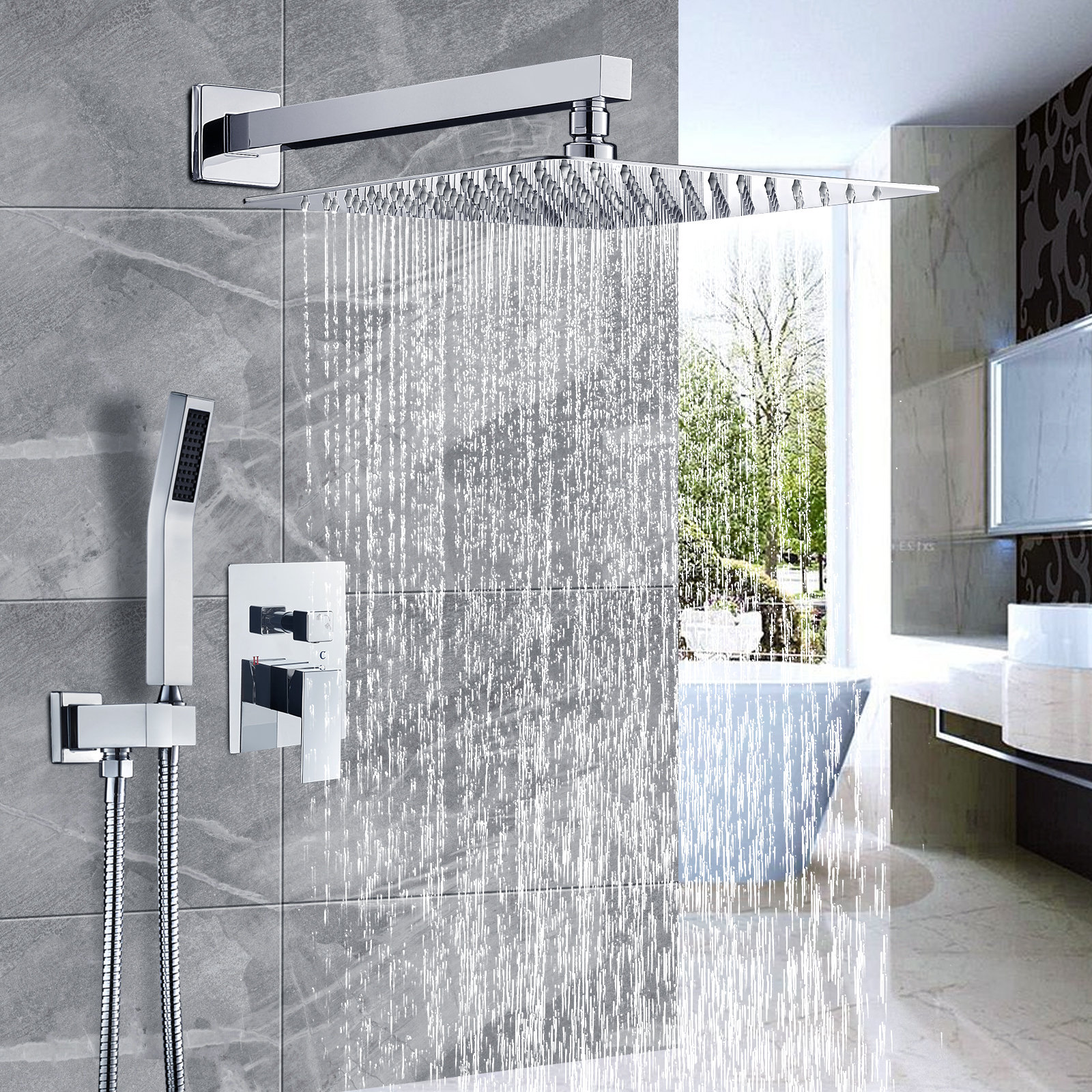The Art of the Shower: A Symphony of Refreshment and Renewal
Dive into the world of the shower and discover its multifaceted significance. This engaging exploration delves into the history of bathing, the science of hydrotherapy, and the therapeutic power of water. From its evolution in design to its impact on mental and emotional well-being, this guide unveils the shower as a profound daily ritual. Whether for relaxation, self-care, or environmental consciousness, the shower is more than cleansing; it's a symphony of life.
The Prelude – A Ritual of Cleanliness

The shower, a daily ritual that we often take for granted, is a remarkable experience that goes far beyond mere cleanliness. It is a symphony of refreshment and renewal, a sanctuary where the cares of the day are washed away, and the soul is revitalized. In this exploration, we'll delve into the multifaceted world of the shower, breaking down its essential components and unveiling the profound impact it has on our physical, mental, and emotional well-being.
The shower begins as a ritual of cleanliness, an essential act of personal hygiene. Here, we uncover the importance of cleansing the body, the history of bathing, and how this fundamental act has evolved over time.
- Origins of Bathing: From ancient communal baths to the private showers of today, we trace the historical evolution of bathing rituals.
- Hygiene and Health: The shower is a powerful tool for maintaining personal hygiene, preventing illness, and promoting overall health.
The Overture – Water, the Elixir of Life
Water, the primary element of the shower, takes center stage in this chapter. We explore the properties of water, its therapeutic effects, and the vital role it plays in the shower experience.
Water offers a plethora of therapeutic benefits, spanning from relaxation to pain relief. These benefits have been harnessed for centuries, from ancient bathhouses to modern hydrotherapy practices. Here's a closer look at the therapeutic advantages of water:
- Relaxation and Stress Reduction:
- Warm Water Comfort: Immersing oneself in warm water, whether in a bath or a shower, can induce a sense of relaxation and comfort. The soothing nature of warm water helps ease muscle tension and promotes mental tranquility.
- Hydrotherapy Pools: Hydrotherapy pools, often used in spa settings, feature warm water and massaging jets. They create a calming atmosphere that aids in stress reduction and relaxation.
- Improved Sleep Quality:
- Evening Baths or Showers: Taking a warm bath or shower in the evening can raise your body temperature, and the subsequent drop as you cool down signals your body that it's time for sleep. This can help you fall asleep faster and enjoy a more restful night.
- Pain Relief:
- Muscle Relaxation: Warm water can help relax sore or tense muscles. It's why hot baths and showers are often recommended for individuals with muscle pain or tension.
- Arthritis Relief: Hydrotherapy, which includes warm water exercises and soaking, is used to relieve arthritis pain. The buoyancy of water reduces pressure on joints, making movement less painful.
- Injury Recovery: Cold water, on the other hand, is effective for reducing inflammation and numbing pain. It's commonly used in cold therapy for sports injuries.
- Enhanced Blood Circulation:
- Heat Dilates Blood Vessels: Warm water causes blood vessels to dilate, increasing blood flow. This can be particularly beneficial for individuals with circulatory issues.
- Skin Benefits:
- Cleansing and Exfoliation: Water, especially when combined with soaps and exfoliating products, helps cleanse the skin by removing dirt, oil, and dead skin cells. This promotes healthier, glowing skin.
- Eczema and Psoriasis Relief: For some individuals with skin conditions like eczema or psoriasis, soaking in warm water can alleviate itching and discomfort. Adding colloidal oatmeal or Epsom salts to the water can enhance these effects.
- Respiratory Health:
- Steam Inhalation: Inhaling steam from a hot shower can help open nasal passages and relieve congestion. This is especially useful during colds or allergies.
- Improved Mental Health:
- Mood Enhancement: Many people find that water has a calming and mood-enhancing effect. Whether it's the rhythmic sound of a shower or the serenity of a bath, water can positively impact mental well-being.
- Mindfulness and Meditation: Showers and baths offer an opportunity for mindfulness and meditation. The soothing sound of running water can help create a meditative atmosphere.
- Hydrotherapy for Specific Conditions:
- Fibromyalgia: Warm water hydrotherapy can provide relief for individuals with fibromyalgia, a condition characterized by widespread pain and sensitivity to touch.
- Anxiety Disorders: Some individuals with anxiety disorders find relief through hydrotherapy and the calming effects of water.
- Emotional Release:
- Catharsis: For many people, a shower or bath is a private and personal space where they can release emotions and find solace. The sound of water can be comforting and provide a safe space for emotional expression. It's essential to note that while water can offer therapeutic benefits, it's not a replacement for medical treatment when needed. Individuals with specific medical conditions or concerns should consult healthcare professionals for appropriate guidance. However, for many, the therapeutic properties of water make the daily shower or bath much more than just a routine; it's a holistic experience that promotes physical, mental, and emotional well-being.
The Instrumentation – Showers Through the Ages
The history of shower designs is a fascinating journey through time. From primitive waterfalls to high-tech rain showers, this chapter explores the evolution of shower technology and aesthetics.
- Early Bathing Facilities: Uncover the earliest bathing facilities, from ancient Roman baths to traditional Japanese onsens.
- Innovations in Shower Design: Learn how modern showers have evolved, incorporating innovative features like digital controls, waterfall showerheads, and chromatherapy. The Crescendo – The Mind-Body Connection
The shower is more than just a physical cleansing; it is a profound experience that engages the mind. This chapter delves into the psychology of showering and its impact on mental and emotional well-being.
- Stress Reduction: Discover how the soothing flow of water and the sensation of warmth in a shower can reduce stress and anxiety.
- Creative Thinking: Many people find their best ideas come to them in the shower. We explore the science behind this phenomenon.

The Aria – A Personal Spa Experience
The shower can transform into a personal spa, offering a luxurious escape from the demands of daily life. In this chapter, we explore the art of creating a spa-like shower experience.
- Aromatherapy: Understand how scents and essential oils can enhance the shower experience, promoting relaxation and rejuvenation.
- Music and Soundscapes: Explore the impact of music and calming sounds on showering, turning it into a sensory journey.
The Intermezzo – Environmental Considerations
The environmental impact of showering cannot be overlooked. In this chapter, we examine sustainable shower practices, from water conservation to eco-friendly products.
- Water Efficiency: Learn about low-flow showerheads and other water-saving measures to reduce your environmental footprint.
- Eco-Friendly Products: Discover eco-conscious shower products, from biodegradable soaps to natural sponges, that promote sustainability.
The Finale – Shower Rituals Around the World
Shower rituals are not universal; they vary across cultures. This chapter explores shower traditions and practices from different parts of the world, shedding light on the diversity of bathing customs.
- Japanese Onsen: Uncover the ancient Japanese tradition of communal baths, celebrated for their natural hot springs.
- Turkish Hamam: Explore the luxurious and therapeutic experience of the Turkish hamam, a blend of bathing and relaxation.
The Encore – Self-Care and Wellness
Self-care is at the heart of the shower experience. This chapter focuses on the importance of self-care and the role the shower plays in promoting overall wellness.
Morning Rituals: Morning rituals involving a shower are more than just a routine; they set the tone for the day ahead. Here's how morning shower rituals contribute to a positive start:
- Wake-Up Call: A morning shower with invigorating water temperatures can serve as a wake-up call for the body and mind. The sensation of water splashing on the skin helps transition from sleep to a state of alertness.
- Mental Preparation: Morning showers offer a quiet, private space where you can mentally prepare for the day. It's an opportunity for focused thinking and planning.
- Stress Reduction: For those who experience morning stress or anxiety, a well-timed shower can help reduce these feelings. The warm water and the calming sound of water can promote relaxation.
- Clean Slate: A morning shower provides a fresh start. It washes away the sleepiness and any emotional residue from the previous night, leaving you feeling clean and rejuvenated.
- Hygiene: Of course, morning showers also serve their primary purpose of maintaining personal hygiene. Cleansing the body in the morning is a basic but essential step in starting the day feeling fresh and ready.
- Hair and Grooming: Many individuals incorporate hair washing and grooming into their morning shower routine, ensuring that they present their best selves as they step out into the world.
Evening Serenity: Evening showers have a different purpose, focusing on relaxation and winding down after a long day:
- Stress Relief: An evening shower is an excellent stress-relief technique. The warm water helps relax muscles and can wash away the stress and tension that accumulate during the day.
- Preparation for Sleep: The drop in body temperature after an evening shower can signal to the body that it's time for rest. This can improve sleep quality and make it easier to fall asleep.
- Hygiene: Evening showers also serve a hygienic purpose, especially for individuals who prefer feeling clean before bedtime.
- Skin Care: Evening showers are an opportunity for a more extended skincare routine, involving facial cleansing, exfoliation, and moisturizing. This can help improve the overall condition of the skin.
- Quiet Reflection: Evening showers are often quieter and more peaceful, creating a space for quiet reflection. The solitude and the sound of water can be meditative, allowing for introspection and relaxation.
- Aromatherapy: Many people use scented shower products in the evening to enhance relaxation. Lavender, chamomile, and other soothing scents can promote a serene atmosphere. morning rituals and evening serenity showers serve different purposes. Morning showers prepare you for the day ahead, offering alertness and mental readiness, while evening showers help you wind down, relax, and prepare for a restful night's sleep. Both have their unique benefits and contribute to overall well-being.
The Shower as a Symphony of Life
The shower is not just a mundane task; it is a symphony of refreshment and renewal. It is a cleansing ritual, a mind-body therapy, a sensory journey, and a moment of self-care. By understanding and appreciating the art of the shower, we can unlock its full potential to elevate our daily lives and promote a holistic sense of well-being. The shower is a remarkable experience, and when approached with intention and mindfulness, it becomes a beautiful symphony that enhances our lives in countless ways.



